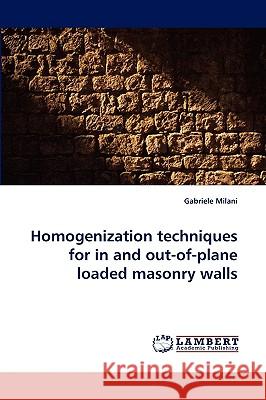Homogenization techniques for in and out-of-plane loaded masonry walls » książka
Homogenization techniques for in and out-of-plane loaded masonry walls
ISBN-13: 9783838367392 / Angielski / Miękka / 2010 / 300 str.
The Thesis presents some numerical models based on homogenization for masonry structures subjected to in- and out-of-plane loads. Joints and bricks are assumed either linear elastic or rigid perfectly-plastic. In the latter case, a simple optimization problem is derived at a cell level to evaluate the macroscopic strength domain of masonry, using both the static and the kinematic theorem of limit analysis. A simple polynomial expansion of the micro-stress field in a finite number of rectangular sub-domains is proposed, suitable to obtain with a very limited computational effort a lower bound estimation of both in- and out-of-plane masonry failure surfaces. Strength domains so recovered are then implemented in suitable FE limit analysis codes for the upper and lower bound estimation of collapse loads and failure mechanisms of entire walls. Finally, the effect of the introduction of FRP strips as reinforcement is discussed using standard FE homogenization in the elastic range.
The Thesis presents some numerical models based on homogenization for masonry structures subjected to in- and out-of-plane loads. Joints and bricks are assumed either linear elastic or rigid perfectly-plastic. In the latter case, a simple optimization problem is derived at a cell level to evaluate the macroscopic strength domain of masonry, using both the static and the kinematic theorem of limit analysis. A simple polynomial expansion of the micro-stress field in a finite number of rectangular sub-domains is proposed, suitable to obtain with a very limited computational effort a lower bound estimation of both in- and out-of-plane masonry failure surfaces. Strength domains so recovered are then implemented in suitable FE limit analysis codes for the upper and lower bound estimation of collapse loads and failure mechanisms of entire walls. Finally, the effect of the introduction of FRP strips as reinforcement is discussed using standard FE homogenization in the elastic range.











